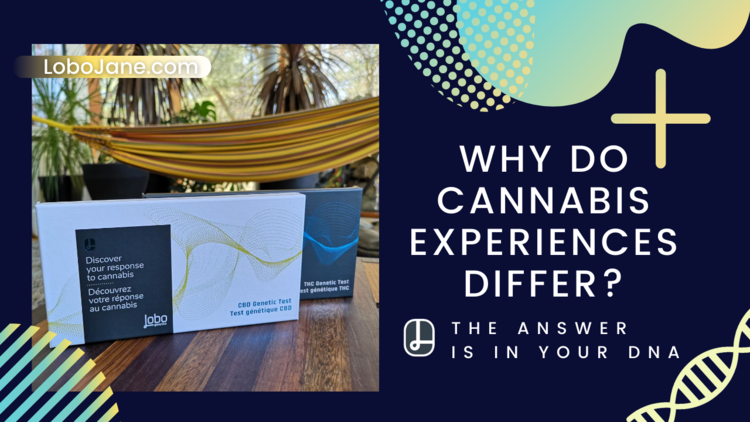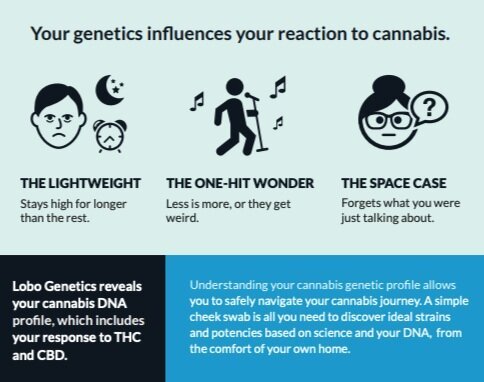There are several genes that impact your cannabis experience. This guide will help you determine which ones they are and how to leverage them for the best high.

Everybody reacts differently. The answer is in your DNA.
We all have that friend who declines the joint when it passes their way. “No thanks, bro! I’m not in the mood to vomit tonight!” they say, followed by giggles and heckling from their friends. While some may dismiss their claims, citing their own positive cannabis experiences, negative short-term adverse effects, such as vomiting (others include anxiety, paranoia, hallucinations, and nausea), actually do have scientific backing.
As it turns out, how someone reacts to cannabis is highly-variable, and much of that response may be genetic. Scientists have identified several genes that impact your cannabis experience. These genes include a pair of liver enzymes, CYP2C9 and CYP2C19, which are responsible for metabolizing THC and CBD, which are responsible for the duration and intensity of the effects of Cannabis. 1 Other genes such as AKT1 and COMT, which are involved in dopamine regulation explain why some people feel anxious or paranoid after consuming THC, and why most of us notice our memory doesn’t work the same way while ‘high’. 2, 3

For example, about 15-20% of the population carries one genetic variation in their CYP2C9 gene (slow THC metabolism) that results in these individuals flushing out THC from their system two-times slower. The result is that the active form of THC is in their bloodstream for longer, amplifying the psychotropic effects of the compound, and potentially leading to the aforementioned negative experiences. Even more interesting are the individuals who possess two variations (Recall: everyone has two copies of all genes, one from mom and one from dad). These individuals (very slow THC metabolism) represent only 1% of the population, and they flush out THC three-times slower resulting in even greater psychotropic amplification. In one study where participants were given oral THC, the very slow metabolizers were shown to have 3x the amount of THC in their system, and it was still detectable in their blood 72hrs after the initial dose. These individuals are more likely to have longer lasting and more intense effects leading to negative experiences while under the influence of THC. 4
AKT1 (THC effects on mental health) and COMT (THC effects on memory) genes both have similar person-to-person variability. Like CYP2C9, certain variations can increase an individual’s risk of negative short-term mental health effects (such as anxiety and memory loss) and can even provide insight on potential long-term impact. 2, 3
Lastly, CYP2C19 is responsible for metabolizing CBD and has no psychotropic effects, but this gene varies the most as individuals can range from very fast, to normal, to very slow metabolizers. Your CBD metabolism rate has an impact on how fast you may feel its effects and how long it will stay active in your system. 5
So the next time your friend declines the joint, share with them your newfound knowledge of cannabis genetics, and perhaps even encourage them to learn about their personal cannabis genetics profile. The good news is that knowing about your DNA means that you can make more informed decisions about how to safely navigate your cannabis journey. Having a certain cannabis genetics profile does not mean that you have to avoid cannabis, it simply means that there are options out there that will provide you with a more pleasant experience (for example CBD-dominant strains versus THC-dominant strains).
Lobo Genetics offers two genetic tests, a THC Genetic Test (tests for Metabolism|CYP2C9, Mental Health|AKT1, and Memory|COMT) and a CBD Genetic Test (tests for Metabolism|CYP2C19) that are available for purchase online.
In addition to learning about your cannabis genetics profile, LoboJane.com will suggest legal Canadian Cannabis product recommendations tailored just for you. Even before you take a Genetic Test, LoboJane.com is powered by decades worth of
Written by: Nick Ramdass & Samantha Gordashko
Article provided by our partners at lobogenetics (www.lobogene.com/en_ca)research and innovative AI technology, making it the most personalized cannabis experience, based on real science.
If you want to receive the latest Higher Learning updates delivered to your inbox, scroll down to subscribe to our newsletter.
REFERENCES:
- Hirota et al. (2013). Impact of genetic polymorphisms in CYP2C9 and CYP2C19 on the pharmacokinetics of clinically used drugs. Drug Metab. Pharmacokinet. 28(1): 28-37. https://pubmed.ncbi.nlm.nih.gov/23165865/
- Morgan CJA et al. (2015). AKT1 genotype moderates the acute psychotomimetic effects of naturalistically smoked cannabis in young cannabis smokers. Transl Psychiatry. 6: 1-6. https://www.ncbi.nlm.nih.gov/pmc/articles/PMC4872423/
- Tunbridge et al. (2015). Genetic moderation of the effects of cannabis: Catechol-O-methyltransferase (COMT) affects the impact of Δ9-tetrahydrocannabinol (THC) on working memory performance but not on the occurrence of psychotic experiences. J.Psychopharmacol. 29(11): 1146-1151. https://pubmed.ncbi.nlm.nih.gov/26464454/
- Sachse-Seeboth et al. (2009).Interindividual variation in the pharmacokinetics of Delta9-tetrahydrocannabinol as related to genetic polymorphisms in CYP2C9. Clinical Pharmacology & Therapeutics. 85(3): 273-276. https://pubmed.ncbi.nlm.nih.gov/19005461/
- Martis et al. (2013). Multi-ethnic distribution of clinically relevant CYP2C genotypes and haplotypes. The Pharmacogenomics Journal. 13: 369–37. https://www.nature.com/articles/tpj201210
- THC Genetic Test for Purchase from Lobo Genetics https://www.lobogene.com/en_ca/our-tests/thc
- Strains by Science, Legal Canadian Cannabis from Lobo Genetics https://www.lobojane.com/


